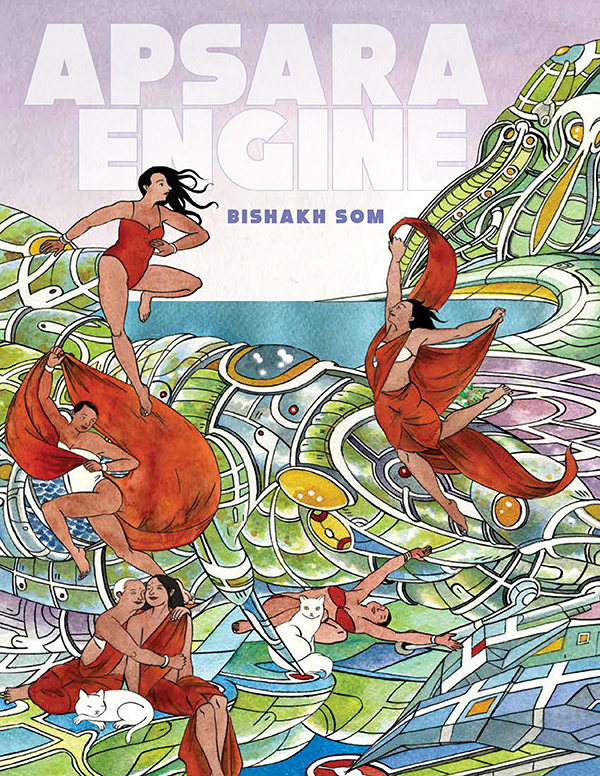Apsara Engine
by Bishakh Som
September 20, 2020
ISBN: 9781936932818
Content note: This review is about a work by a South Asian author, telling stories and imaginative futures about South Asian people; the author of this review is not of South Asian heritage.
From the very front cover, Apsara Engine lets us know that it explores themes and structures where we may not be able to rely on comforting conventions, but that relinquishing those conventions can free us. This graphic short story collection is authored by Bishakh Som, a trans South Asian comics artist, and it portrays many South Asian characters with diverse body shapes and gender expressions, including multiple characters identified explicitly within their stories as trans or nonbinary.
The collection opens with Come Back to Me, a story whose images and captions begin to feel less and less related to each other as it progresses. As the narrator confides in the reader about their domestic relationship and a past affair in the captions, the images portray the narrator’s sudden capture by a mermaid on a beach and their disorienting spiral into ocean depths. Throughout the collection, this theme of mundane and extraordinary crashing together occurs many times. In Throat, a character runs across a casual acquaintance with a part-human part-animal pet, and is struck by how much more intelligent it seems than its owner. I Can See It In You passes as a more everyday story at first, until its main character is met by someone familiar to him, who tells him his future with uncanny and puzzling specificity. In Pleasure Palace, an older woman humors an insistent young man seeking connection with her, journeying with him and telling him a mythical-sounding story of her past as a royal. When they reach her destination, it turns out to be a femme paradise, where the woman is centered in the power of her multitudes of rich lived experiences.
Many of the stories use maps and architecture as grounding themes, including Apsara Engine, for which the collection is named. Apsara Engine is the only story without a linear narrative, instead portraying a multitude of human interactions and internal thoughts across multiple settings at singular moments, first across a rolling waterscape-like city map, then cinematically zooming in to an angular metallic hotel, panning to a futuristic-looking private residence, and finally into a salon-like room; throughout, we see hints of a political uprising. Swandive, by contrast, is highly narrative. It follows Onima and Amrit, two self-identified Desi trans people who meet and bond at an academic conference where Onima delivers a talk on trans geographies. Their journey together takes a turn through magical realism, transforming Onima’s abstract talk into a fully realized vision.
All of Som’s stories center a human desire for connection, and many of them have lingered in my mind long after I finished reading them. Each story, in its own way, centers relationships and community, especially for those who move through their relationships in ways that trouble mainstream conceptions of binary gender. As a collection, the stories outline, constellation-like, the potential of imagining and fantasizing about the future, not solely through the lens of technological advancement and capitalist production, but also through an expanded understanding of what it means to grow and be in relationships with intersecting marginalized identities.
Review by Anastasia Chiu. Editing assistance by Nadia Sahi.

